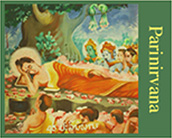







page 3 of 5
********
The most common cause for doubt in an omnipotent creator is suffering in the world. The strict Darwinist should wonder what the fuss is about. According to Darwinism, biological entities struggle to survive, perishing if unfit, and achieve success through reproduction. That's the end of the story. Under Darwinism, humans should not bitterly ponder suffering; it is the necessary mechanism for weeding out weak individuals and species.
But people instinctively want to understand the nature of their condition in metaphysical terms, and that includes their suffering.
Hinduism is based on the idea that the world contains suffering, brought on by misdeeds in one's prior lives. Transcending this world and its suffering leads to the state of salvation. Enlightenment is required for liberation from a cycle of birth, death and rebirth in a world of hardship.

The Buddha noted that all life is suffering. This suffering is the result of desire, craving and grasping. Buddhism's answer to suffering is to remove all desire of the material world: abandonment and nonattachment. Extinguishing all desire leads to blissful Nirvana.
Judaism finds suffering in punishment by an angry God. The punishment is either for sin or disobedience, or it is a test of the believer's commitment to God. The Book of Job documents God permitting the torture of Job by Satan.
Christianity makes a critical leap. It proposes that the Creator took on human form to undergo the worst physical and emotional suffering imaginable in the form of betrayal, scourging and crucifixion. This belief system encompasses a Creator who empathizes with the suffering of humans. Jesus is the answer to Job.
A group of Eastern Christian thinkers called the Cappadocians, writing in the fourth century, understood what this meant for Christianity.
Gregory of Nazianzus wrote of mankind, "And having been first chastened by many means…by plagues, by waters, by fires, by wars…at last he needed a stronger remedy, for his diseases were growing worse." The remedy is Jesus; Gregory wrote of Jesus, "He was sent, but as man, for He was of a twofold Nature; for He was wearied, and hungered, and was thirsty, and was in agony, and shed tears according to the nature of a corporeal being." In another passage, Gregory mused, "He teacheth, now on a mountain….And perhaps He goes to sleep, in order that He may bless sleep also; perhaps He is tired that He may hallow weariness also; perhaps He weeps that He may make tears blessed."
Basil of Caesarea observed that the world is "the school for rational souls to exercise themselves, the training ground for them to learn to know God."
Another way to understand suffering is to consider the way humans tell stories. Good stories involve difficult quests or challenges to overcome. Whether we look at Homer's ancient Odyssey or Tolkien's modern Lord of the Rings, the protagonists' ordeals are the heart of the story. If Homer allowed Odysseus to return home happily to Ithaca after four paragraphs, the story would not have been handed down for three thousand years. If Tolkien allowed Frodo to destroy the One Ring by dropping it into his fireplace at home, the story would not have sold fifty million copies over six decades. Tolkien described the writer of a tale as the sub-creator; he considered story-telling an act of creation akin to the original creation of the world. If story-telling is an appropriate metaphor for human life, then the suffering of our favorite fictional characters is analogous to the suffering in our own lives.
| © Copyright 2006-2007 PDH |    |